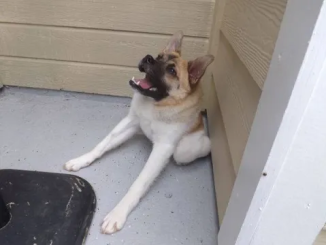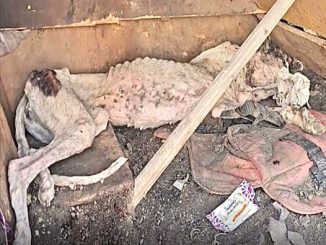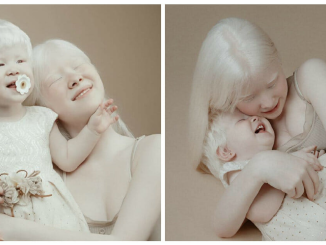
In the impoverished Gaza Strip, where most people struggle to make ends meet amid a crippling blockade, the suffering of stray dogs and cats often goes unnoticed.
Said el-Er, who founded the territory’s only animal rescue organisation in 2006, has been trying to change that. He and other volunteers rescue dogs and cats that have been struck by cars or abused and nurse them back to health – but there are too many.
So in recent weeks they have launched Gaza’s first spay-and-neuter programme. It goes against taboos in the conservative Palestinian territory, where feral dogs and cats are widely seen as pests and many view spaying and neutering as forbidden by Islam.
“Because the society is Muslim, they talk about halal (allowed) and haram (forbidden),” Mr El-Er said. “We know what halal is and what haram is, and it’s haram (for the animals) to be widespread in the streets where they can be run over, shot or poisoned.”
Islam teaches kindness towards animals, but Muslim scholars are divided on whether spaying and neutering causes harm. Across the Arab world, dogs are widely shunned as unclean and potentially dangerous, and cats do not fare much better.
Mr El-Er and other advocates for the humane treatment of animals face an added challenge in Gaza, which has been under an Israeli and Egyptian blockade since the Islamic militant group Hamas seized power in 2007. Gaza’s two million residents suffer from nearly 50 per cent unemployment, frequent power outages and heavy travel restrictions.
With many struggling to meet basic needs, animal care is seen as a waste of precious resources or a luxury at best. Mr El-Er’s group, Sulala for Animal Care, relies on private donations, which can be hard to come by.
Mr El-Er says his team can no longer keep up with the number of injured animals that they find or that are brought to the clinic. “The large number of daily injuries is beyond our capacity,” he said. “That’s why we resorted to neutering.”
On a recent day, volunteers neutered a street dog and two cats that had been brought in. There are few veterinary clinics and no animal hospitals in Gaza, so they performed the operations in a section of a pet store that had been cleaned and disinfected.
“We have shortages in capabilities, tools, especially those needed for orthopaedic surgeries,” said Bashar Shehada, a local veterinarian. “There is no suitable place for operations.”
Mr El-Er has spent years trying to organise a spay and neutering campaign but met with resistance from local authorities and vets, who said it was forbidden. He eventually secured a fatwa, or religious ruling, stating that it is more humane to spay and neuter animals than to consign an ever-growing population to misery and abuse.
Once the fatwa was issued, Mr El-Er said local authorities did not object to the campaign as a way of promoting public health and safety. The Hamas-run health and agriculture ministries allowed veterinarians to carry out operations and purchase supplies and medicine, he said.
The Gaza City municipality provided land for a shelter earlier this year. Before that, Mr El-Er kept the rescued animals at his home and on two small tracts of land that he leased.
The new shelter currently houses around 200 dogs, many of them blind, bearing scars from abuse or missing limbs from being hit by cars. At least one was adjusting to walking with a prosthetic limb. A separate section holds cats in similar shape.
The group tries to find homes for the animals, but here too it faces both economic and cultural challenges. Very few Gazans would keep a dog as a pet, and there’s little demand for cats. Some people adopt the animals from abroad, sending money for their food and care.
Over the past decade, international animal welfare groups have carried out numerous missions to evacuate anguished animals from makeshift zoos in Gaza and relocate them to sanctuaries in the West Bank, Jordan and Africa.
But there are no similar campaigns for dogs and cats, and Gaza has been sealed off from all but returning residents since March to prevent a coronavirus outbreak.
Mr El-Er’s phone rang recently and the caller said a dog had been hit by a car. Volunteers from Sulala brought it back to the shelter on the back of a three-wheeled motorbike and began treating it. Mr El-Er says they receive around five such calls every day.
“Pawsome Achievement: Service Dog Receives Honorary Diploma for Exceptional Dedication at Owner’s Graduation”
Brittany Hawley’s Incredible Adventure with Her Faithful Sidekick, Griffin 🐕

Let me introduce you to Brittany Hawley, a 25-year-old from North Carolina who has faced tremendous challenges due to a chronic neurological disease that confined her to a wheelchair when she was still in her teens. However, Brittany’s life changed for the better when she applied for a service dog to help her with her daily routines. That’s when she met Griffin, a golden retriever who would become her constant companion. This remarkable duo met through a special program called ‘paws4prison.’ This program trains inmates in West Virginia prisons to train highly skilled assistance dogs. When Brittany and Griffin first met, several dogs were presented to her, but Griffin stood out. Unlike some dogs that were wary of her wheelchair, Griffin jumped straight into Brittany’s lap and showed her affection.

Recently, Brittany accomplished an important goal by completing her master’s degree in occupational therapy from Clarkson University. This was a momentous occasion not only for her but also for her loyal companion, Griffin. Throughout Brittany’s years of study, Griffin played a crucial role in her life, attending classes with her, retrieving her phone, and actively participating in her community activities, social groups, and research projects. Griffin even supported her during her internship at Fort Bragg.
When the four-year-old golden retriever received his honorary diploma, it was a recognition of his “extraordinary effort, steadfast commitment, and diligent dedication to the well-being and student success” that contributed to Brittany’s achievements. Brittany proudly said, “I advocated for Griffin’s graduation from day one. He did everything I did.”
Brittany and Griffin proved to be an invaluable team for soldiers grappling with physical limitations and psycho-social issues. Griffin’s presence was so significant during therapy sessions that patients often referred to him as a co-therapist alongside Brittany. On a daily basis, Griffin helps Brittany with various physical tasks such as opening doors, turning on lights, and retrieving objects indicated by a laser pointer. However, what Brittany values the most about Griffin is his ability to comfort her during times of anxiety and depression, which has helped her manage the constant pain that she experiences. Brittany’s story demonstrates the remarkable impact that service dogs like Griffin can have, thanks to their highly specialized training that equips them to provide assistance and emotional support to individuals with disabilities, mental health conditions, and other qualifying circumstances.

Brittany’s experience with her furry friend, Griffin, is a remarkable testament to the indomitable connection that exists between people and their canine pals. This bond effortlessly overcomes obstacles and acknowledges the influence of willpower and affection. 🌟🐕



Leave a Reply